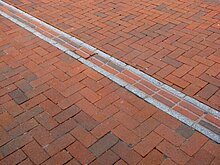Freedom Trail
| Freedom Trail | |
|---|---|
 Special markers implanted in the sidewalk denote the stops along the Freedom Trail | |
| Length | 2.5 mi (4.0 km) |
| Location | Boston, Massachusetts |
| Established | 1951 |
| Designation | National Millennium Trail |
| Trailheads | Boston Common to Bunker Hill Monument in Charlestown |
| Use | Walking, History |
| Difficulty | Easy |
| Sights | 16 historical sites |
| Surface | Brick |
| Website | www |


The Freedom Trail is a 2.5-mile-long (4.0 km) path[1] through Boston that passes by 16 locations significant to the history of the United States. It winds from Boston Common in downtown Boston, to the Old North Church in the North End and the Bunker Hill Monument in Charlestown. Stops along the trail include simple explanatory ground markers, graveyards, notable churches and buildings, and a historic naval frigate. Most of the sites are free or suggest donations, although the Old South Meeting House, the Old State House, and the Paul Revere House charge admission. The Freedom Trail is overseen by the City of Boston's Freedom Trail Commission[2] and is supported in part by grants from various non-profit organizations and foundations, private philanthropy, and Boston National Historical Park.
The Freedom Trail was conceived by journalist William Schofield in 1951, who suggested building a pedestrian trail to link important landmarks. Boston mayor John Hynes decided to put Schofield's idea into action. By 1953, 40,000 people were walking the trail annually.[3]
The National Park Service operates a visitor center on the first floor of Faneuil Hall, where they offer tours, provide free maps of the Freedom Trail and other historic sites, and sell books about Boston and United States history.
Some observers have noted the tendency of the Freedom Trail's narrative frame to omit certain historical locations, such as the sites of the Boston Tea Party and the Liberty Tree.[4]
Official trail sites
[edit]The official trail sites are (generally from south-to-north):[5]
- Boston Common
- Massachusetts State House
- Park Street Church
- Granary Burying Ground
- King's Chapel and King's Chapel Burying Ground
- Boston Latin School Site/Statue of Benjamin Franklin
- Old Corner Bookstore
- Old South Meeting House
- Old State House
- Boston Massacre Site
- Faneuil Hall
- Paul Revere House
- Old North Church
- Copp's Hill Burying Ground
- USS Constitution
- Bunker Hill Monument
Notes: The Black Heritage Trail crosses the Freedom Trail between the Massachusetts State House and Park Street Church. The Boston Irish Famine Memorial is also located along the Freedom Trail, between the Old Corner Bookstore and the Old South Meeting House. The New England Holocaust Memorial is located a few steps off the Freedom Trail, just north of Faneuil Hall.
In popular culture
[edit]The Freedom Trail is a significant plot point in the 2015 video game Fallout 4, helping the player to find the Railroad faction's headquarters.
References
[edit]- ^ "Black Heritage/Freedom trail". Google My Maps. Retrieved October 13, 2021.
- ^ "Freedom Trail". City of Boston. Retrieved November 1, 2013.
- ^ O'Connor, Thomas H. (1993), Building a new Boston: politics and urban renewal, 1950–1970, Boston: Northeastern University Press, ISBN 978-1-55553-161-4, ISBN 155553161X
- ^ Alfred F. Young (March 21, 2004), "The Trouble with the Freedom Trail", Boston Globe
- ^ "The Freedom Trail official website".
Further reading
[edit]- Bahne, Charles (2005). The Complete Guide to Boston's Freedom Trail (Guidebook) (3rd ed.). Cambridge, Massachusetts: Newtowne Pub. ISBN 978-0961570521.
- Booth, Robert (2008). Pietrzyk, Cindi (ed.). Boston's Freedom Trail, Trace the Path of American History (Guidebook). Jack Frost (8th ed.). Guilford, CT: Globe Pequot. ISBN 978-0762747696. Retrieved May 21, 2012.
Freedom Trail.
- MacQuarrie, Brian (January 30, 1996). "Freedom Trail is fading: Consultant says route past city's historic sites needs overhaul to draw tourists". Boston Globe.
- Mead, Philip (2007). "Walking the Freedom Trail: Some lessons from Iraq". Common Place. 8 (1).
- Schofield, William G. (1988). Freedom by the Bay: The Boston Freedom Trail. Wellesley, MA: Branden Books. ISBN 978-0828319225. Retrieved May 20, 2012.
- Young, Alfred F. (2003). "Revolution in Boston? Eight Propositions for Public History on the Freedom Trail". The Public Historian. 25 (2): 17–41. doi:10.1525/tph.2003.25.2.17.
External links
[edit]- Freedom Trail Foundation
- The Black Heritage Trail Archived July 2, 2010, at the Wayback Machine
- Boston National Historic Park
- The Boston Harbor Walk
- The Freedom Trail – Boy Scouts of America pamphlet
- 1798 Map of Boston
- Clough's 1798 Atlas of Boston (circa 1900)
- 1640 Map of Boston
- History of the Freedom Trail
- PDF Map of the Freedom Trail
- Mapping Boston History
